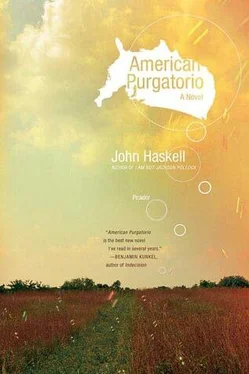John Haskell - American Purgatorio
Здесь есть возможность читать онлайн «John Haskell - American Purgatorio» весь текст электронной книги совершенно бесплатно (целиком полную версию без сокращений). В некоторых случаях можно слушать аудио, скачать через торрент в формате fb2 и присутствует краткое содержание. Год выпуска: 2006, Издательство: Picador, Жанр: Современная проза, на английском языке. Описание произведения, (предисловие) а так же отзывы посетителей доступны на портале библиотеки ЛибКат.
- Название:American Purgatorio
- Автор:
- Издательство:Picador
- Жанр:
- Год:2006
- ISBN:нет данных
- Рейтинг книги:3 / 5. Голосов: 1
-
Избранное:Добавить в избранное
- Отзывы:
-
Ваша оценка:
- 60
- 1
- 2
- 3
- 4
- 5
American Purgatorio: краткое содержание, описание и аннотация
Предлагаем к чтению аннотацию, описание, краткое содержание или предисловие (зависит от того, что написал сам автор книги «American Purgatorio»). Если вы не нашли необходимую информацию о книге — напишите в комментариях, мы постараемся отыскать её.
Los Angeles Times
American Purgatorio — читать онлайн бесплатно полную книгу (весь текст) целиком
Ниже представлен текст книги, разбитый по страницам. Система сохранения места последней прочитанной страницы, позволяет с удобством читать онлайн бесплатно книгу «American Purgatorio», без необходимости каждый раз заново искать на чём Вы остановились. Поставьте закладку, и сможете в любой момент перейти на страницу, на которой закончили чтение.
Интервал:
Закладка:
“I don’t get up here much anymore,” the man says, and then he opens the hatch, and when we crawl out into the normal light, the possibility doesn’t vanish.
We climb back down the hay and I don’t mind the straw in my socks. I like it. I like everything. I feel energized, buoyed, and the feeling has something to do with the man, or the presence of the man, who is smiling, narrow-shouldered but erect, looking at me as if I am a source of pride. The watery whites of his eyes are cloudy, but the dark center, from behind which he seems to be looking, is bright.
When the man speaks, the words coming out of his mouth are reassuring, or have the intention of reassuring. For instance, “On the road.” He says these words out loud, infusing them with nobility, declaring them as a state of being. “On the road.”
“That’s right,” I say.
“You were on the road,” he says, and he says it with a seriousness that stills me. He is looking at me.
“Yes,” I say.
“I can see,” he says. And it seems as if suddenly he’s lucid. “Do you know what’s happened to you?”
“You mean about my wife?” I say. And the man doesn’t answer.
I think what he sees is some truth about me, not a secret inside of me, but what I am. And he can see that I don’t know myself what that is, and so all he can do is stand there, with a bandage on his cheek, looking at me with his watery, compassionate eyes.
Once we’re outside, I try to slide the barn door shut by myself, but it’s stuck. I am trying to do a good deed by closing the door but I can’t get it rolling on its rollers. Even with both hands, even leaning into it with all my weight, the gate doesn’t move. At which point the old man holds the side of it, pulling it onto its tracks. He tells me to try again, and this time, on its rollers, the thing easily slides shut.
“Thanks,” I say.
“You’d do the same,” he says.
And then he starts walking, looking down at the path of his feet. When he gets to the house he turns around, having already forgotten who I am; but trusting whatever I am, he smiles and walks inside. I would like to follow. I like his house and I like him, and although I want to stay with him, I can’t.
6
As human beings we have an idea of who or what we are, and we like to keep that idea intact. And although this desire for a sense of self isn’t a sin, like a sin we can get excessive about it. Two hundred years ago Keats spoke about the ability to live without definite answers and borders, and because I’m a man who makes adjustments, at the moment I’m willing to do that. At the moment I’m with Linda, following her directions, driving with her, and I’m willing to know nothing but what’s in front of me, or in this case next to me, in the car. And not only am I willing to simply see her, I’m also willing to send her something, something reassuring. I’m trying, in some quasi-physical way, to send her something good.
But how do you do that? How do you wish another person well? It’s probably not so difficult, but with her I’m having a little trouble. And the trouble is Anne. I need to believe that Anne will remain in my life, but at the moment Anne’s not here.
Linda and I are driving deeper into the woods, into steeper, more rugged country, and at a particular turnoff she tells me to pull over, and I pull off the main road onto a rutted dirt road and we drive up that road until we come to the end. We get out of the car, walk up through a trail in the grass, and arrive at a clearing at the top of a hill. There’s a metal structure, with a platform at the top, a lookout above the trees, open to the elements.
“There’s the view,” she says. “Up there.”
And then she walks down a slight incline to another part of the clearing. There’s a pool, a reflecting pool made of stone, abandoned now, covered with lichen and moss, built by human hands a long time ago. There’s a shallow layer of water in the pool and she doesn’t walk in the water at first. Instead she walks along the stones describing the pool’s perimeter. The sun is shining enough so that she feels like taking off her shoes, which she does. She’s dancing from stone to stone, and she knows I’m watching, and although she doesn’t know who I am, it doesn’t seem to matter.
And I’m thinking along the same lines. That who she is is partly transparent, or rather the outside of who she is is transparent. I see through the layer of linen pants and skin to something else, to a person. It’s an image of her and it’s my image of her, and as I watch the image of her I’m thinking about Anne.
When we were first getting to know each other, before we’d even had sex, Anne and I took a trip to the beach. It was summer and she was wading into the tidepools with her pants rolled up and a light shirt on and the waves on the rocks and I always suspected she got wet so that I would see her and want her, and if that was her plan it worked.
And you might think that I would be thinking of that time with joy and happiness, but I’m not. Those times, I’m beginning to think, are gone. With my feet in the present and my mind in the past, my emotional attachment to that memory is beginning to fade. And I would be willing to let it fade, except even if it’s part of a past chapter in my life with Anne, there are other chapters coming, chapters filled with love and intimacy. I’m thinking that what existed in my past was love and that you can’t manufacture love or manufacture passion, and a person has to believe that those things — love and passion and life itself — will exist again, in the future.
I say I’m thinking, but it’s not so much thinking as telling myself. I’m trying to influence my thoughts. And also my feelings, the thoughts of my body. Somewhere in my body I’m enjoying what’s happening now. I’m enjoying the splashing of, and proximity to, this other person, and although I’m not trying to cancel the past or filter it out, I’m afraid that what is happening now will cause Anne to disappear.
To the extent that we make our own future, I want to make one I can hold on to. I need Anne, sure, but what exists right now is real. I am real and Linda is real, and real things have a certain attraction, and so I turn to Linda, and when she looks back at me I don’t do anything. I don’t try to change or correct or filter anything out. I let Linda be Linda. It just happens. And the fact of its happening is frightening because I’m not used to Linda. But I tell myself — looking at her — that what is happening is reality. Whether I’m making it or not, the sun is shining. Part of the rectangular pool is cast in light and part in shade and she has pulled up her pants and she’s splashing in the water, laughing occasionally in the sunlight.
I’m perched on the rock ledge, sitting in the sun, and when she splashes me I enjoy it. She’s holding her shoes in her fingers, her socks tucked inside, and you’d have to call it dancing what she does. The sun drops down farther into the trees and the sunlight disappears and by the time she steps out of the water of the pool she’s, not wet, but damp, and she’s shivering. I loan her my jacket and without guilt or memory or sadness getting in the way, we sit. I hold her in my arms, feeling the coldness of her skin and the warmth beneath that skin.
When Anne lived above the flower store on Sixth Avenue it happened like this many times. I came in the door and there she was, demure and polite but obviously excited, her etiquette not intending to mask her excitement. And without much talk we removed our clothes and then she jumped onto me. Her legs spread around my hips and I was lifting her and holding her so that her chest was level with my nose and mouth, and then lowering her down, and without any help from any hands we came together like that, sometimes her arms getting tired from holding on and sometimes my legs getting tired supporting her, and when this preliminary congress was over, I carried her to the bed and we fell finally, relaxed, into each other’s arms. And then showering, and in the shower if the mood was right, we would repeat ourselves.
Читать дальшеИнтервал:
Закладка:
Похожие книги на «American Purgatorio»
Представляем Вашему вниманию похожие книги на «American Purgatorio» списком для выбора. Мы отобрали схожую по названию и смыслу литературу в надежде предоставить читателям больше вариантов отыскать новые, интересные, ещё непрочитанные произведения.
Обсуждение, отзывы о книге «American Purgatorio» и просто собственные мнения читателей. Оставьте ваши комментарии, напишите, что Вы думаете о произведении, его смысле или главных героях. Укажите что конкретно понравилось, а что нет, и почему Вы так считаете.











